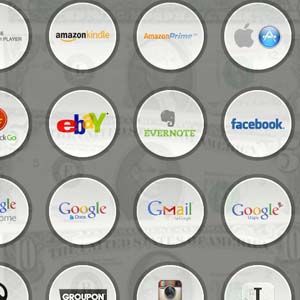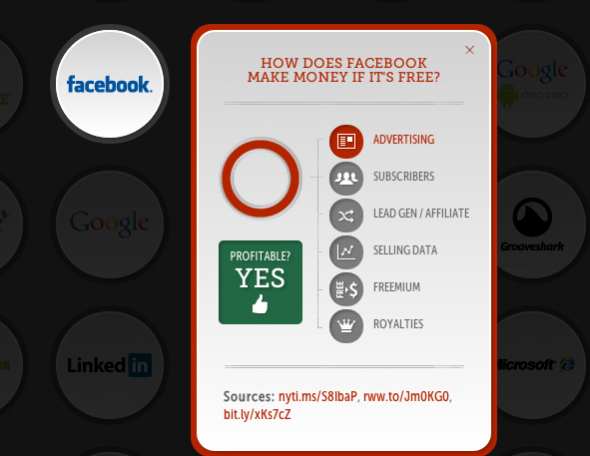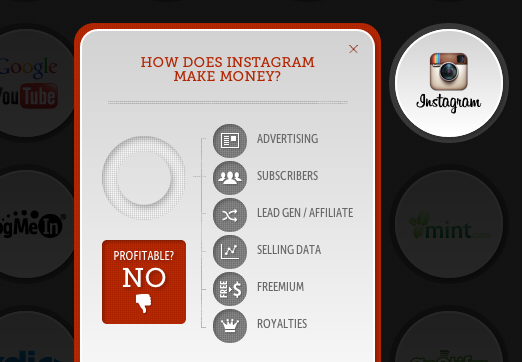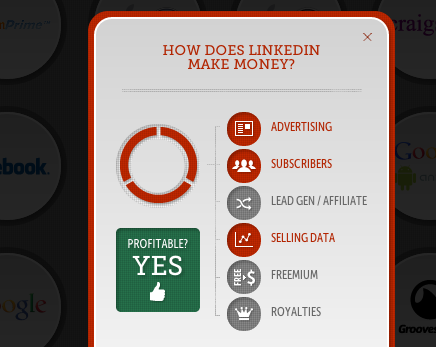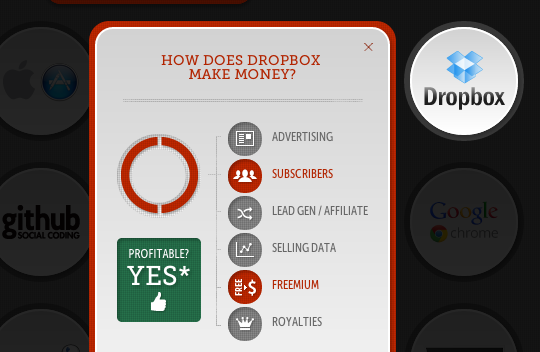Find out how your favorite sites on the web make money. "How Do They Make Money" is an interactive site that lets you quickly find your favorite tech companies, and you should check it out.
Why? It's not a bad question. Most web users seem not to care how their favorite sites make money – until a given site makes a policy change they don't like. There are patterns behind the madness. Almost every site on the web needs to generate some revenue – even if it's just enough to keep the servers running. Knowing how because how these sites make money ultimately determines how they're run – meaning you're less likely to be surprised by changes made to the service. We've outlined how social networks make money for exactly this reason.
It's been said millions of times on the web: if you're not actually paying for a product you're not the customer but the product being sold. But just how are you being sold? That depends entirely on the product in question, and exactly which strategies they're using in order to become profitable.
Some companies — including Google and Twitter – earn money by showing you advertisements. Others – including Evernote and Dropbox – give away a free version of their product in the hopes people will be enticed to pay for a full version. And some companies aren't profitable at all, at least right now.
What does this mean for you, the user? It's worth thinking about, but before you can do that you need to know how the various services you use make money to begin with. That's where "How Do They Make Money" comes in handy.
Head to How Do They Make Money to get started. Once there, you'll see a series of circular icons. Click any icon and you'll see a simple summary of how a given service makes money:
As you can see above, the service outlines six main ways sites can make money - Advertising, Subscribers, Lead Generation and/or Affiliate Links, Selling Data, Freemium and Royalties. Some of these arguably overlap, but there are also distinctions. On the left you'll see whether a given service is profitable or not, and at the bottom you'll find the site's sources for its information.
This is a very simple way to summarize whether and how a given service is making money, but what does it matter to you? More than you'd think. For example, if a service isn't making money you can certainly expect it to change a lot or disappear soon.
Instagram is a great example of this. Before being sold to Facebook, the famous photo-sharing service had no revenue stream whatsoever – even though the server costs for running one of the web's biggest photo sharing services was massive. Knowing this, it's obvious something was going to change at some point, even after the company was purchased by Facebook. The recent controversy about Instagram is probably only the beginning.
As XKCD recently pointed out, offering free photo storage indefinitely isn't a great way to run a business. Users should expect something to change.
Some sites have multiple revenue streams – for example, LinkedIn. This social network shows advertisements to its users, as I'm sure you know, but did you realize it also sells access to user information to recruiters?
People want to find work using LinkedIn, so I'm sure most users don't have a problem with this revenue scheme. It's still a good thing to know.
Just one more, and then you have to visit How Do They Make Money and explore for yourself, okay?
Dropbox is free for the vast majority of its users, yet is still widely believed to be profitable. How is that possible? Put simply, its incredibly loyal free userbase is downright evangelical about the product. They tell friends and family to get an account and use the service to share files with them. Obsessive bloggers write articles about uses for Dropbox and creative Dropbox ideas, spreading the word to the web daily. The free userbase helps spread the product, leading (eventually) to paying subscribers who need more space.
So for now having free users works because it leads to subscribers. Does that mean Dropbox will be free forever? Not necessarily.
These are just my interpretations, but I'm pointing to something larger - understanding the business model behind a service can help you understand the ways in which it might change. Don't be caught off guard. Check out How Do They Make Money right now and educate yourself.
Conclusion
I'll say it one more time - if you're not personally paying for a product, you are not the customer but the product being sold. That's not necessarily a problem, but it's a good thing to be aware of before you start complaining about changes a given service makes. Facebook ultimately isn't accountable to you; it's accountable to advertisers. This doesn't mean Facebook should ignore any and all complaints you make. After all, their job is to deliver you to an advertiser, something that's easier if you like their service. But there's a complex calculus to any and all changes that balance.
Oh, and how does MakeUseOf make money? We're basically in the advertising realm, even if we do make some (read: very little) revenue by selling our free manuals on Amazon (they won't let us give them away).
Do you have any other thoughts about the intersection of the Internet and economics? Leave them below.

